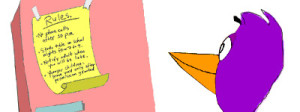 We love to diagnose whenever we hear something – deciding in advance what the person’s problem is, usually before they even ask for a solution. This rampant practice is a big roadblock to communication.
We love to diagnose whenever we hear something – deciding in advance what the person’s problem is, usually before they even ask for a solution. This rampant practice is a big roadblock to communication.
Playing amateur therapist where we think we already know what the person’s problem is, or amateur detective probing for unconscious motives and/or hidden agendas –both impede good communication.
Teen: I flunked the math test again. I just don’t get math.
Parent: The reason your grades aren’t better in school is because
you watch too much TV and don’t study enough.
Teen: So who asked for your opinion anyway?
One alternative communication method to diagnosing is to ask open-ended questions, which provides space for the adolescent to explore his thoughts without being hemmed in.
An open-ended question does not lead to a ‘yes’ or ‘no’ answer and should be designed to help her clarify her own problem, rather than provide unsolicited information (i.e. your opinion) to the asker. By asking open-ended questions the parent can better understand the child without directing the conversation.
Open-ended questions should be asked one at a time, focusing on the perspective and concerns of the child. Sometimes these questions are statements.
Teen: I flunked the math test again. I just don’t get math.
Parent: What is it about math that you don’t get?
Teen: How can you help? What do you know about this new math anyway?
Parent: Try me.
COMMUNICATION TAKEAWAY: There are many roadblocks to good communication, with ‘diagnosing’ as one of the big ones. While it’s hard to change language and thought patterns that automatically pop out, it can be done with conscious effort and practice. To stop the bad habit of diagnosing the other person unsolicited, simply think before you speak. It’s really that simple. It’s also really hard to change. Then re-word that diagnosis with an open-ended question instead. Your communication with your child will benefit if you diagnosis yourself as guilty of having this habit and changing it.










